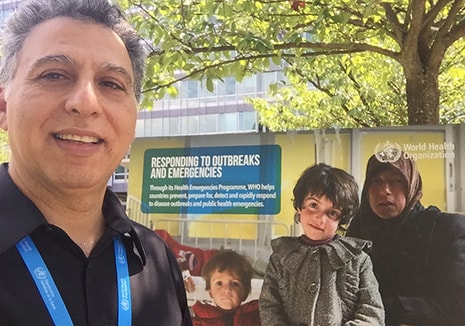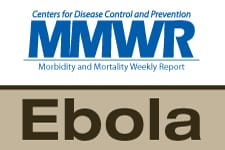Protecting the Health of Communities

Shah Roohi working at the World Health Organization’s headquarters in Geneva, Switzerland.
People travel more now than they ever have before, from city to city and across international borders. And making sure travelers from and in the Democratic Republic of the Congo, which is battling a year-long outbreak of Ebola virus disease, aren’t bringing that illness with them is what keeps Shahrokh Roohi busy.
Roohi, RN, MPH, is a senior advisor for preparedness and response at CDC. During this Ebola outbreak, he and his colleagues have worked to identify population movement patterns, strengthen traveler screening in DRC, and provide travelers with pertinent health information.
His team supports traveler risk assessments and fever and symptom checks at roadside health checkpoints and airports in DRC and countries neighboring the outbreak area, which bolster public health surveillance activities to detect and isolate ill travelers. “These efforts help to contain the outbreak in the region and build on preparedness activities in the United States,” he says.
Roohi was deployed to the WHO headquarters in Geneva at the beginning of the current outbreak in DRC in August 2018. While in Geneva, he worked with international partners on preparedness and response strategies to contain potential traveler-associated spread of Ebola within DRC and to neighboring countries.
“It was interesting to see first-hand how WHO interacts with ministries of health and other partners to find solutions to complex public health response issues,” Roohi says. “It was wonderful to see people from diverse backgrounds and nationalities working together toward common goals.”
When asked if he would do it again, Roohi doesn’t hesitate to answer yes. He adds, “It’s certainly challenging and intense at times. Upon reflection though, I get satisfaction from knowing that I played a part in important work that creates better living conditions for a community or a country. What you give is nothing compared to the personal satisfaction and professional enrichment you’ll experience.”
Back in Atlanta, he led a border health task force that supports the response’s incident manager and provides direction and assistance to deployed staff in DRC and the countries neighboring the outbreak area.
“On any given day, we’re in constant communication with our field staff to learn about their activities and provide them with the most up-to-date information available,” Roohi says. “We also provide feedback to the incident manager and the other CDC response workers, so they are all aware of our field activities. We want to know what the bigger picture is and how it relates to global migration-related issues, so we can plan the next steps and stay ahead of the outbreak.”
The CDC technical expertise, established protocols, and response procedures help make progress possible, but many challenges remain.
“I think the most challenging part of this outbreak is the insecurity in the area, and that CDC responders are unable to be on the ground in a lot of the locations where the disease is being spread,” he says. “It’s not possible to have a 100 percent accurate picture of what’s happening.”
Working on a response, however, does provide ample rewards according to Roohi. “One of the great things about this response has been the people. It’s great to see people rise to the occasion and respond effectively under difficult circumstances. I’ve become friends with people from different disciplines in CDC and in partner organizations. I’ve had the opportunity to work with some brilliant and dedicated people who I may not have gotten to know otherwise.”
It’s no secret that response workers get out of their comfort zone and give up a great deal of personal time for CDC response missions, but Roohi points out that it’s possible – in fact, it’s essential – to stay grounded.
“It’s a big sacrifice to give up time from family and friends during a response,” he says. “Yet it’s still possible and very important to reserve time for yourself to maintain balance and stay mindful.”
When he’s not working on response issues, Roohi enjoys the peace he gets from being outdoors.
“To relax, I like to go for a walk or hike, even if it is a short one. I also like to experiment with making new dishes and trying foods from different cultures.”

